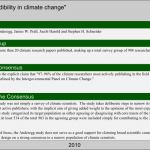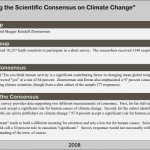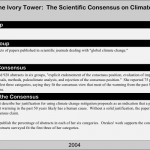The DNC gives us a supplemental URL leading to NASA’s website. That webpage mostly consists of evidences supporting the reality of climate change, though a sidebar says 97 percent of climate scientists believe it very likely that human activities are chiefly responsible for climate change patterns observed over the past century. A tab on the page leads to another page identifying NASA’s sources for the 97 percent consensus claim.
Analyzing the Rhetoric
Is climate change just a liberal scare tactic? To address that question we’ll have to look at two associated claims from the DNC’s “Your Republican Uncle” website. The “scare tactic” accusation fits if Democrats exaggerate the threat of damage to the environment or economy stemming from Republican obstruction of climate change legislation.
The Role of “Just”
When the DNC says it’s a myth that climate change is “just” a scare tactic it opens wide the door for the DNC’s claim to be technically true and misleading at the same time. Democrats could use climate change as a scare tactic, but if it’s also anything else then it’s not just a scare tactic.
97 percent of scientists?
Once again we see an exaggeration of the scientific consensus on climate change. We’re still waiting on a survey that makes use of dependable methods, and it’s common to see misrepresentation of the nature of the consensus. Even NASA, the DNC’s source, is guilty of the exaggeration in this case:
Ninety-seven percent of climate scientists agree that climate-warming trends over the past century are very likely due to human activities, and most of the leading scientific organizations worldwide have issued public statements endorsing this position.
The 97 percent claim leads to a footnote naming three studies that would support the claim. We reviewed each of them for an article exploring the 97 percent consensus claim. Briefly, the Anderegg (2010) study focuses on the most-published climate scientists, not climate scientists overall. The Zimmerman (2008) study gets its 97 percent figure from a subset (77 responses) of actively publishing climate scientists who agreed the human contribution to climate change is “significant.” The Oreskes (2004) study examined published papers and found no consensus higher than about 75 percent.
- Anderegg
- Zimmerman
- Oreskes
If you can’t trust NASA, whom can you trust?
Of the three studies cited, the Anderegg study comes closest to supporting the 97 percent consensus NASA claims. But the consensus is not for climate scientists but for the narrower category of most-published climate scientists. And it certainly isn’t a consensus of “scientists” as the DNC claims.
Endangering Our Environment?
Republicans helped obstruct the Kyoto Treaty and a cap-and-trade system for limiting carbon dioxide emissions. Let’s assume limiting carbon dioxide emissions would lessen the danger to the environment. Under that assumption, the DNC’s claim is no less than trivially true: Republican actions endanger the environment to some degree under that assumption. We would point out, however, that the consensus is weaker among climate scientists on the catastrophic effects from climate change. The real effects of climate change are not precisely known, and measures like the Kyoto treaty do little to change the situation by themselves. The U.S. met its Kyoto CO2 goals without ever ratifying the treaty largely by shifting to natural gas produced though new drilling technologies. It’s therefore a stretch to attach Republican resistance to the Kyoto treaty to endangering the environment.
Hurting Our Economy?
We admit our puzzlement at the idea that climate change legislation helps boost the economy. Apparently the notion is very popular in Europe. About 80 percent of Europeans think acting to address climate change helps the economy. We looked to the European Commission for an explanation:
It is estimated that meeting the 20% renewable energy target could have a net effect of creating around 417,000 additional jobs, while getting on track to achieve the 20% energy efficiency improvement in 2020 is forecast to boost net employment by some 400,000 jobs.
It sounds great, but what’s the rationale behind the glowing prediction? Perhaps liberal economist Paul Krugman can explain? We looked at a Krugman column dealing with the EPA’s proposed limits on CO2 emissions:
In particular, building new, low-emission power plants would employ both workers and capital that would otherwise be sitting idle, and would, if anything, give the U.S. economy a boost.
Krugman’s conclusion seems based on the expectation that government-dictated spending on higher-cost electrical power will give a short-term Keynesian boost the economy. The assumption ignores the downside of paying more for energy.
Even if 80 percent of Europeans see it as Krugman sees it, not all economists see higher energy costs as a boon to the economy. Economist Robert U. Ayres, with Benjamin Warr, explains an alternative view (bold emphasis added):
What will be the impact of rising energy (exergy) prices on economic growth? Standard theory says there is little or no link between energy costs and growth. We disagree. Our results suggest that the link is much stronger than conventional theory admits. We think that economic growth in the past has been primarily not ‘technological progress’ in some general and undefined sense, but specifically by the availability of ever cheaper energy — and useful work — from coal, petroleum (or gas). These energy-related price declines can no longer be expected to drive economic growth in the future. Clearly higher energy prices will — other things being equal — result in reduced demand for energy and therefore for energy services and all the other goods and services that depend on energy inputs.
U.K. sustainability expert Tim Jackson reaches a related conclusion (bold emphasis added):
The idea of a non-growing economy may be an anathema to an economist. But the idea of a continually growing economy is an anathema to an ecologist. No subsystem of a finite system can grow indefinitely, in physical terms. Economists have to be able to answer the question of how a continually growing economic system can fit within a finite ecological system.
We will not try to settle this disagreement among experts. But we think the economic message coming from the left seems inconsistent. We encourage readers to explore the issue more deeply than we present it here.
As for the DNC’s claim, it simply isn’t clear that Republican obstruction of climate change legislation has hurt the economy. It’s an unsettled issue, and the DNC does nothing to settle it.
Summary
“Myth: Climate change is just a liberal scare tactic.”
Climate change isn’t “just” a liberal scare tactic. The climate’s changing, and humans probably have something to do with it regardless of liberals’ political agenda. On the other hand, climate change works very well as a scare tactic to encourage Americans to accept a heightened role for the federal government in their daily lives. The DNC’s rhetoric encourages a black-or-white fallacy: If climate change isn’t “just” a liberal scare tactic then it isn’t a scare tactic at all. The DNC makes use of a rhetorical booby trap.
“97% of scientists … agree that climate change is real and believe that humans are probably causing it.”
NASA serves as the source of the DNC’s claim, but NASA specified climate scientists. And the 97 percent figure doesn’t work as NASA used it. NASA’s best support comes from a study looking at scientific papers on climate science, intentionally giving the most weight to scientists who were published the most. About 84 percent of climate scientists accept that humans play a dominant role in causing recent climate change.
“Republican obstruction on policies to address climate change endangers our environment and hurts our economy.”
We don’t know for sure whether obstructing climate change legislation seriously endangers our environment or hurts our economy. The DNC offers no argument supporting its assertion, and we could find no solid reason to accept the DNC’s claim.
Late edit, July 1, 2014: Inserted a line originally intended for the “Overview” section: “But it doubles as a pretty good scare tactic.”
Correction and update, July 13, 2014: We had neglected to include the disclaimer “bold emphasis added” to our quotation of the Ayres paper we cited. We’ve fixed that, and also updated the formatting of the rating system images to conform to our usual practice.
References
“The Democrat’s Guide to Talking Politics with Your Republican Uncle.” Your Republican Uncle. The Democratic National Committee, 27 Nov. 2013. Web. 24 June 2014.
“Consensus: 97% of Climate Scientists Agree.” Climate.NASA.gov. NASA, n.d. Web. 28 June 2014.
Hovi, Jon, Detlef F. Sprinz, and Guri Bang. “Why the United States Did Not Become a Party to the Kyoto Protocol: German, Norwegian, and US Perspectives.” European Journal of International Relations 18.1 (2010): 129-50. Potsdam.de. University of Potsdam, 2010. Web. 24 June 2014.
Ryan, Alana. “80% of Europeans Agree Tackling Climate Change Boosts Economic Growth.” Theclimategroup.org. The Climate Group, 05 Mar. 2014. Web. 24 June 2014.
Krugman, Paul. “Cutting Back on Carbon.” The New York Times. The New York Times, 29 May 2014. Web. 24 June 2014.
Ayres, Robert U., and Benjamin Warr. The Economic Growth Engine. Northampton: Edward Elgiar, 2010. Google Books. Google, 2010. Web. 28 June 2014.
“Faculty and Research.” INSEAD.edu. INSEAD, n.d. Web. 24 June 2014.
Dean, James W. Prosperity without Growth. London: Earthscan, 2009. Association for Political Studies, Kazakhstan. Association of Political Science, 2009. Web. 24 June 2014.
David J. Murphy and Charles A. S. Hall. 2011. Energy return on investment, peak oil, and the end of
economic growth in “Ecological Economics Reviews.” Robert Costanza, Karin Limburg & Ida Kubiszewski, Eds. Ann. N.Y.
Acad. Sci. 1219: 52–72.
Stern, David I. “The Role of Energy in Economic Growth.” CCEP Working Paper 3.10 (2010): n. pag. Center for Climate Economics & Policy. Australian National University, 2010. Web. 29 June 2014.
Heshmati, Almas. An Empirical Survey of the Ramifications of a Green Economy. IZA Discussion Paper, No. 8078. March 2014. Web. 26 June 2014.
Smulders, Sjak, Michael Toman, and Cees Withagen. Growth Theory and” Green Growth. No. 135. Oxford Centre for the Analysis of Resource Rich Economies, University of Oxford, 2014. Web. 26 June 2014
“Evaluating Climate Policy Options, Costs and Benefits.” EPA. Environmental Protection Agency, n.d. Web. 26 June 2014.
Scheer, Hermann. The solar economy: Renewable energy for a sustainable global future. Routledge, 2013. Web. 26 June 2014.











